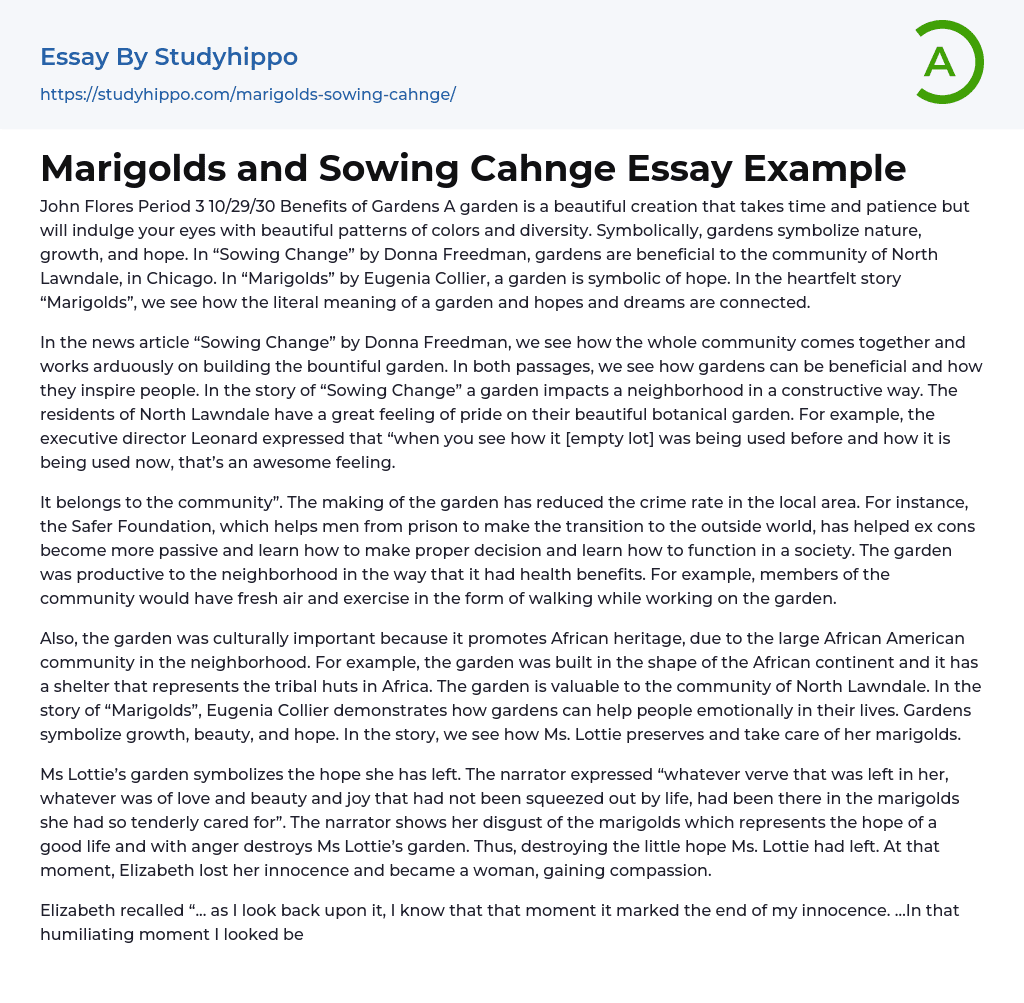Benefits of Gardens
A garden is a beautiful creation that takes time and patience but will indulge your eyes with beautiful patterns of colors and diversity. Symbolically, gardens symbolize nature, growth, and hope. In “Sowing Change” by Donna Freedman, gardens are beneficial to the community of North Lawndale, in Chicago. In “Marigolds” by Eugenia Collier, a garden is symbolic of hope. In the heartfelt story “Marigolds”, we see how the literal meaning of a garden and hopes and dreams are connected.
In the news article “Sowing Change” by Donna Freedman, we see how the whole community comes together and works arduously on building the bountiful garden. In both passages, we see how gardens can be beneficial and how they inspire people. In the story
...of “Sowing Change” a garden impacts a neighborhood in a constructive way. The residents of North Lawndale have a great feeling of pride on their beautiful botanical garden. For example, the executive director Leonard expressed that “when you see how it [empty lot] was being used before and how it is being used now, that’s an awesome feeling.
It belongs to the community”. The making of the garden has reduced the crime rate in the local area. For instance, the Safer Foundation, which helps men from prison to make the transition to the outside world, has helped ex cons become more passive and learn how to make proper decision and learn how to function in a society. The garden was productive to the neighborhood in the way that it had health benefits. For example, members of the community would have fresh air and exercise in th
form of walking while working on the garden.
Also, the garden was culturally important because it promotes African heritage, due to the large African American community in the neighborhood. For example, the garden was built in the shape of the African continent and it has a shelter that represents the tribal huts in Africa. The garden is valuable to the community of North Lawndale. In the story of “Marigolds”, Eugenia Collier demonstrates how gardens can help people emotionally in their lives. Gardens symbolize growth, beauty, and hope. In the story, we see how Ms. Lottie preserves and take care of her marigolds.
Ms Lottie’s garden symbolizes the hope she has left. The narrator expressed “whatever verve that was left in her, whatever was of love and beauty and joy that had not been squeezed out by life, had been there in the marigolds she had so tenderly cared for”. The narrator shows her disgust of the marigolds which represents the hope of a good life and with anger destroys Ms Lottie’s garden. Thus, destroying the little hope Ms. Lottie had left. At that moment, Elizabeth lost her innocence and became a woman, gaining compassion.
Elizabeth recalled “... as I look back upon it, I know that that moment it marked the end of my innocence. …In that humiliating moment I looked beyond myself and into the depths of another person. This was the beginning of compassion, and one cannot have both compassion and innocence”. Now being fully able to understand the aged woman she finally understood that the marigolds were much more than a patch of flowers. It was hope that there
was still beauty in their poor town and that one can still achieve ones dreams despite society’s limitations.
The two stories conveyed that gardens are beneficial to society in the literal and symbolical sense. In “Sowing Change” we saw how the community came together and grew physically and morally through the creation of the beautiful garden. The marigolds in Eugenia Collier’s story represented hope for Ms Lottie and the narrator. It also, helped the narrator discover her path into womanhood. The two literary passages are both connected showing us how gardens are important and can be influential in our lives.
- Adoption essays
- Aunt essays
- Babies essays
- Bedroom essays
- Caring essays
- Children essays
- Daughter essays
- Divorce essays
- Dog essays
- Dysfunctional Family essays
- Family Tradition essays
- Family Values essays
- Father essays
- Foster Care essays
- Friends essays
- Grandparent essays
- Home essays
- Hometown essays
- Husband essays
- Jealousy essays
- Love essays
- Marriage essays
- Mother essays
- Online Dating essays
- Parenting essays
- Parenting Teens essays
- Parents essays
- Relationship essays
- Room essays
- Sibling essays
- Sister essays
- Wedding essays
- Wife essays
- Ambition essays
- Anger essays
- Betrayal essays
- Boredom essays
- Confidence essays
- Courage essays
- Desire essays
- Disgrace essays
- Doubt essays
- Empathy essays
- Fairness essays
- Fear essays
- Feeling essays
- Forgiveness essays
- Grief essays
- Guilt essays
- Happiness essays




